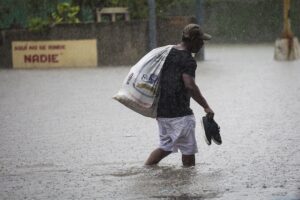
Published 02/08/2023 11:49 AM
Turkish President Recep Tayyip Erdogan said 13 million of the country’s 85 million people were affected and declared a state of emergency in 10 provinces. The state of emergency extends the powers of the president, who does not need to appeal to Parliament.
Erdogan visited Kahramanmaras on Wednesday and announced plans to help earthquake survivors. With that, he forced the hotels closed for the winter to reopen to house the affected families. The largest are housed in churches and makeshift tents to keep warm.
“Currently, we hold meetings with hotels in regions such as Antalya, Alanya, Mersin. If there are those who want to stay in hotels, we are ready to accommodate our citizens”.
He stated that they will build and deliver massive housing for those whose homes are destroyed within 1 year. He also pledged 10,000 lira (about R$2,800 or US$530) of support to families affected by earthquakes. Today we are more comfortable, tomorrow we will be more comfortable.
“We will not allow citizens to be homeless,” Erdogan said. “The state housing authority will do whatever is necessary.” The government needs to deal with the challenge that people avoid entering buildings in fear of them collapsing too.
The same attention is not paid to the homeless in Syria, which is divided by a civil war. The armed blockade of territories dominated by rebels and government supporters of Bashar Al-Assad, make it impossible to send humanitarian aid and rescue teams.
To make matters worse, the Syrian cities that were already destroyed by the war were rebuilt in a precarious and fast way. The fragile structural conditions made the devastation even greater.
In Turkey, many areas did not completely collapse or, at least, allowed families to escape, due to the construction conditions of the buildings. Since the last earthquake, the Turkish government has tightened enforcement on the safe construction of buildings. Most of those who fell are from before the new urban order.
time running out
Officials and medics said 8,574 people had died in Turkey and 2,662 in Syria, bringing the total to 11,236. But that could still increase dramatically if experts’ worst fears are realized.
Hopes of rescuing more people under the rubble are now fading as time has passed since Monday’s pre-dawn earthquake, the biggest in Turkey since 1939, when an estimated 33,000 people died in the eastern province of Erzincan.
The head of the World Health Organization, Tedros Adhanom Ghebreyesus, warned that time was running out for the thousands of injured and those still trapped.
In Syria, at least 1,280 people have died in the opposition-held northwest, with more than 2,300 injured, according to volunteer first responders known as the White Helmets. The Syrian government has reported an additional 1,250 deaths.
The rescue team, also known as the Civil Defense of Syria, said on Twitter that the number of victims is expected to “increase significantly due to the presence of hundreds of families under the rubble, more than 50 hours after the earthquake”.
Search teams from more than 20 countries joined more than 24,000 Turkish emergency workers and pledges of help arrived.
But among those whose relatives were still under the rubble, help was slow to come.
In Gaziantep, rescue teams were racing against time to find survivors. Unfortunately, this is now a recovery operation, not a rescue operation. Voices are no longer heard under the rubble.
stuck in the cold
Even for the survivors, the future looks bleak. Many took refuge from relentless tremors, cold rain and snow in mosques, schools and even bus stops, burning rubble to stay alive.
In Gaziantep, where violent aftershocks resound, shops are closed, there is no heat because gas pipes have been cut to prevent explosions and finding gasoline is difficult.
Only the bakeries remain open, attracting long queues.
Some of the worst damage in Gaziantep Province occurred in the most remote districts, where hundreds of buildings collapsed.
With the airport and many roads outside the city blocked, attempts to flee the city were thwarted.
Source: vermelho.org.br

